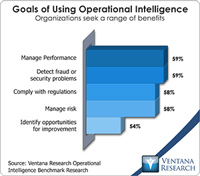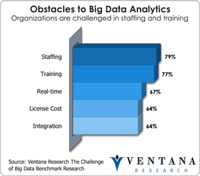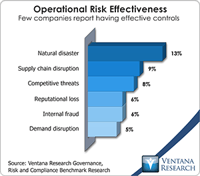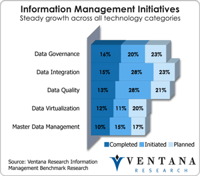All the hubbub around big data and analytics has many senior finance executives wondering what the big deal is and what they should do about it. It can be especially confusing because much of what’s covered and discussed on this topic is geared toward technologists and others working outside of Finance, in areas such as sales, marketing and risk management. But finance executives need to position their organization to harness this technology to support the strategic goals of their company. To...
Read More
Topics:
Big Data,
Performance Management,
Predictive Analytics,
Customer Experience,
Fraud,
Governance,
GRC,
Office of Finance,
audit,
Controller,
Analytics,
Business Analytics,
Cloud Computing,
Governance, Risk & Compliance (GRC),
Operational Intelligence,
Business Performance Management (BPM),
CFO,
compliance,
finance,
Financial Performance Management (FPM),
Information Management (IM),
Risk,
Financial Performance Management,
financial risk management
IBM hosted the Big Data and Analytics Analyst Insights conference in Toronto recently to emphasize the strategic importance of this topic to the company and to highlight recent and forthcoming advancements in its big data and analytics software. Our firm followed the presentations with interest. My colleagues Mark Smith and Tony Cosentino have commented on IBM’s execution of its big data strategy and its approach to analytics. As well, Ventana Research has conducted benchmark research on ...
Read More
Topics:
Big Data,
Office of Finance,
Operational Performance Management (OPM),
MRO,
Analytics,
Business Analytics,
Business Intelligence,
IBM,
Operational Intelligence,
Business Performance Management (BPM),
Customer Performance Management (CPM),
Financial Performance Management (FPM),
Sales Performance Management (SPM),
FPM,
Maximo,
TM1,
Watson
In some parts of the world, bribing government officials is still considered a normal cost of doing business. Elsewhere there has been a growing trend over the past 40 years to make it illegal for a corporation to pay bribes. In the United States, Congress passed the Foreign Corrupt Practices Act (FCPA) in 1977 in the wake of a succession of revelations of companies paying off government officials to secure arms deals or favorable tax treatment. More recently other governments have implemented...
Read More
Topics:
SAP,
ERP,
Governance,
GRC,
Operational Performance Management (OPM),
bribery,
Business Analytics,
Governance, Risk & Compliance (GRC),
IBM,
Operational Intelligence,
Oracle,
Business Performance Management (BPM),
CFO,
compliance,
Financial Performance Management (FPM),
FPM,
Oversight Systems
The idea of devising and using maturity assessments to improve business performance has been a staple of management, functional and strategic consultants for decades. It’s based on two unassailable principles. One is the general assertion that companies differ in their ability to do anything along a range from nonexistent to advanced. The second is that at any time it’s possible for a knowledgeable individual to construct a scale of competence for some business function from least to most...
Read More
Topics:
Performance Management,
Social Media,
Customer Experience,
Governance,
Operational Performance Management (OPM),
Business Analytics,
Business Collaboration,
Business Intelligence,
Cloud Computing,
Governance, Risk & Compliance (GRC),
Operational Intelligence,
Business Performance Management (BPM),
Customer Performance Management (CPM),
Financial Performance Management (FPM),
Information Applications (IA),
Information Management (IM),
IT Performance Management (ITPM),
Sales Performance Management (SPM),
Supply Chain Performance Management (SCPM),
Workforce Performance Management (WPM),
benchmark,
FPM
One of the community groups to which I donate my time is an organization that puts on a Concours d’Élegance – a vintage car show. Such Concours date back to seventeenth-century France, when wealthy aristocrats gathered to see who had the best carriages and most beaudacious horses. Our Concours serves as the centerpiece to a broader mission of raising money for several charities. There a many such events in the United States and elsewhere, but this one, which has been held every year since 1956,...
Read More
Topics:
Big Data,
GRC,
Operational Performance Management (OPM),
Business Analytics,
Business Intelligence,
CIO,
Operational Intelligence,
Business Performance Management (BPM),
CFO,
finance,
Financial Performance Management (FPM),
Information Management (IM),
IT Performance Management (ITPM),
Talent Management,
FPM
Our research consistently finds that defects in data are the root cause of a wide range of problems encountered by modern corporations. The magnitude of the problem correlates with the size of the company: Big companies have bigger headaches than midsize ones. Data issues diminish productivity in every part of a business as people struggle to correct errors or find workarounds. Issues with data are a man-made phenomenon, yet companies seem to treat bad data as some sort of force of nature like...
Read More
Topics:
Big Data,
Predictive Analytics,
GRC,
Operational Performance Management (OPM),
Business Analytics,
Business Intelligence,
CIO,
Operational Intelligence,
Business Performance Management (BPM),
CFO,
Customer Performance Management (CPM),
finance,
Financial Performance Management (FPM),
Information Management (IM),
IT Performance Management (ITPM),
Sales Performance Management (SPM),
Supply Chain Performance Management (SCPM),
Workforce Performance Management (WPM),
FPM
Risk has always been an integral part of business, but our recent Governance, Risk and Compliance (GRC) benchmark research shows that companies deal with risk with varying degrees of effectiveness – especially operational risk. A majority of companies lag in their overall GRC maturity, as I covered in a recent blog post. Operational risk management should be of greater interest to executives today because they can have greater control of it than before. The expansion of IT systems to automate...
Read More
Topics:
Big Data,
Performance Management,
Predictive Analytics,
Customer Experience,
Governance,
GRC,
Operational Performance Management (OPM),
Management,
Analytics,
Business Analytics,
Business Collaboration,
Business Intelligence,
Governance, Risk & Compliance (GRC),
Operational Intelligence,
Business Performance Management (BPM),
compliance,
Customer Performance Management (CPM),
finance,
Financial Performance Management (FPM),
Information Applications (IA),
Information Management (IM),
IT Performance Management (ITPM),
Risk,
Sales Performance Management (SPM),
Supply Chain Performance Management (SCPM),
Workforce Performance Management (WPM),
financial risk management
Anyone who focuses on the practical uses of information technology, as I do, must consider the data aspects of adopting any new technology to achieve some business purpose. Reliable data must be readily available in the necessary form and format, or that shiny new IT bauble you want to deploy will fall short of expectations. Our research benchmarks cover a range of core business and IT processes, and they regularly demonstrate that data deficiencies are a root cause of issues organizations have...
Read More
Topics:
Social Media,
GRC,
Operational Performance Management (OPM),
IBM Business Analytics,
Business Analytics,
Business Collaboration,
Business Intelligence,
CIO,
Governance, Risk & Compliance (GRC),
Operational Intelligence,
Business Performance Management (BPM),
CFO,
Customer Performance Management (CPM),
finance,
Financial Performance Management (FPM),
Information Applications (IA),
Information Management (IM),
Sales Performance Management (SPM),
Supply Chain Performance Management (SCPM),
Workforce Performance Management (WPM)
I recently spoke with Oversight Systems, an operational intelligence analytics company that uses predictive analytics and optimization to help companies save money, reduce the risk of loss and fraud, and reinforce corporate governance and compliance efforts. Ventana Research views operational intelligence as an emerging technology with the potential for a high return on investment. By continuously monitoring activities in a company’s IT systems, Oversight’s Web-based software continuously,...
Read More
Topics:
Big Data,
Predictive Analytics,
Fraud,
Governance,
GRC,
Office of Finance,
Operational Performance Management (OPM),
audit,
Analytics,
Business Analytics,
Cloud Computing,
Governance, Risk & Compliance (GRC),
Operational Intelligence,
Business Performance Management (BPM),
Financial Performance Management (FPM),
Information Management (IM),
Sales Performance Management (SPM),
Supply Chain Performance Management (SCPM),
controls,
Oversight Systems
Infor described this year’s Inforum user group meeting as a coming-out party for a large startup company. Such a debut was necessary because Infor had been operating in something of a stealth mode for the past three years: a limited marketing presence, no unified message and a weak, sometimes inconsistent brand identity. It also needed to formally introduce Infor to customers of Lawson, the ERP supplier it acquired last year. The “startup” designation is meant to signal that Infor has been able...
Read More
Topics:
Performance Management,
Salesforce.com,
SAP,
Social Media,
Sustainability,
ERP,
Human Capital Management,
Marketing,
Operational Performance Management (OPM),
Epiphany,
expense management,
Lawson,
Business Analytics,
Business Collaboration,
Business Intelligence,
Business Mobility,
Cloud Computing,
Governance, Risk & Compliance (GRC),
IBM,
Operational Intelligence,
Oracle,
CRM,
Customer Performance Management (CPM),
finance,
Financial Performance Management (FPM),
Infor,
Information Applications (IA),
Information Management (IM),
IT Performance Management (ITPM),
Sales Performance Management (SPM),
Supply Chain,
Supply Chain Performance Management (SCPM),
Workforce Performance Management (WPM),
Financial Performance Management















